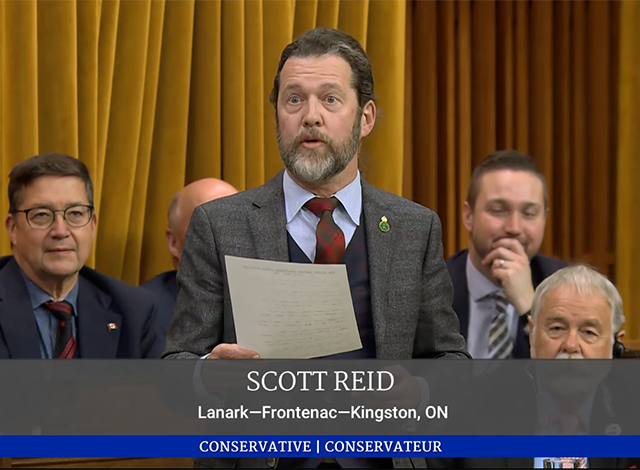Police Service Boards to consolidate to 1 in Lanark County
BY LAURIE WEIR
The Ministry of the Solicitor General has announced changes to the Community Safety and Policing Act 2019, which will come into effect April 1, 2024.
Perth town council on Tuesday, Feb. 6 during a regular meeting, received a letter of correspondence from Phil Whitton, superintendent, Municipal Policing Bureau Commander, that “municipalities will continue to be billed in accordance with costs in the statements. Under the CSPA, all municipalities policed by the OPP will be subject to Regulation 413/23 Amount Payable by Municipalities for Policing from Ontario Provincial Police. This regulation preserves the cost-recovery methodologies currently in effect. The OPP Billing Model cost allocation method remains the same under Reg. 413/23. There are transitional provisions included in the Regulation that stipulate that 2024 annual billing statements will not need to be reissued.”
Coun. Isabel Anne McRae asked if there was a new price tag associated in moving to the CSPA from the PSA.
“I understand there a need to be a cost recoverable, (but) is there any notion of an increase in the next two budgets during the tenure of our council,” she asked.
Deputy Mayor Ed McPherson said the OPP budget is set up “based on calls per service based on the number of homes in the Town of Perth,” he said.
Brian Burns, the town’s director of finances and town treasurer, said, “There is also a Pro Rata allocation across the province of how much we are compared to the total.”
McPherson added that that they (as a member of the Police Services Board) are in the process of disbanding to become one large PSB across the county, “which has to be in place by April 1 and we’re gathering the financial data and the working data about how we’re going to assign costs.”
McPherson said it would change anything for the town cost wise.
Burns added, “except for the pro rata share of the board expenses we don’t currently have.”
McRae asked what the rationale behind the change was.
“There hasn’t been an update in the Police Service Act in 20 years,” McPherson said. “The government decided we needed a new policing act in Ontario.”
The 2024 approved OPP contract is $1,591,139.
CHANGES TO THE ACT
SOLGEN is seeking to amend the ACT and make consequential amendments to other statutes. Once in force, the CSPA will replace the current Police Services Act (PSA). The CSPA is an opportunity to modernize policing and enhance community safety in Ontario.
The CSPA would be amended to do the following:
Police Oversight and Governance-related Amendments
• Add the ability to appoint and delegate powers to vice chairs on the Ontario Police Arbitration and Adjudication Commission. The Commission will maintain rosters of adjudicators and registers of arbitrators for hearings required under the CSPA;
• Provide the Minister with the ability to make various regulations relating to Ontario Provincial Police detachment boards, which will provide oversight of policing delivered by the Ontario Provincial Police, including regulations creating exemptions from the requirement to have a detachment board for every detachment;
• Remove the requirement to establish the Ontario Provincial Police Governance Advisory Council;
• Require vacancies on police service boards to be promoted to the public with regard to the need to ensure that boards represent the communities they serve;
• Allow for regulations to permit the Ontario Civilian Police Commission to undertake duties beyond those already specified in the CSPA once the CSPA comes into force, during the transitional period before it is dissolved; and
• Give the Complaints Director of the Law Enforcement Complaints Agency (the Office of the Independent Police Review Director today) an additional 30 days to review investigations where no misconduct was found, upon request by a complainant.
Police Labour Arbitration-related Amendments
• Remove “police service” as a party to arbitrations regarding a police association’s duty of fair representation to an association member;
• Require arbitrators to render decisions on police labour matters sooner if hearings are completed quickly;
• Ensure arbitrators who are already seized of a police arbitration matter hear any disputes arising in connection with an award, decision, or agreement;
• Ensure the Chair of the Ontario Police Arbitration and Adjudication Commission is notified when parties to a budget dispute require the Chair to appoint an arbitrator because they could not jointly appoint one; and
• Require parties to a municipal police service budget dispute to pay the costs of the budget arbitration, instead of the province.
Officer Recognition and Education-related Amendments
• Maintain the educational eligibility requirements for police officers of a secondary school diploma or equivalent as it currently exists under the PSA, and allow for proof of higher education instead of meeting this requirement;
• Mirror the police educational eligibility requirements for special constables; and
• Make all police officers and First Nation Officers in the province who achieve a prescribed rank eligible to receive a King’s Commission, instead of just OPP officers.
Improve Alignment with Other Government Statutes and Clarification:
• Remove requirements relating to data integration and defer such requirements to regulation, to avoid conflict with changes in the law on this topic since the CSPA was passed;
• Provide the ability to define the meaning of “emergency” for the purpose of the Act in the regulations, including for the purpose of determining when chiefs of police can make requests to other police services for emergency support;
• Add research regarding compliance with the Act and regulations to the Inspector General’s duties, in addition to analysis, monitoring, advising, and inspecting for this purpose; and
• Require the Inspector General to consider lesser measures for remedying non-compliance by policing entities before imposing more serious measures, without reducing the Inspector General’s discretion to impose any measure the Act provides for.
Technical Amendments
The changes would also clarify ambiguities, ensure consistency throughout the Act; and fix minor drafting errors.























